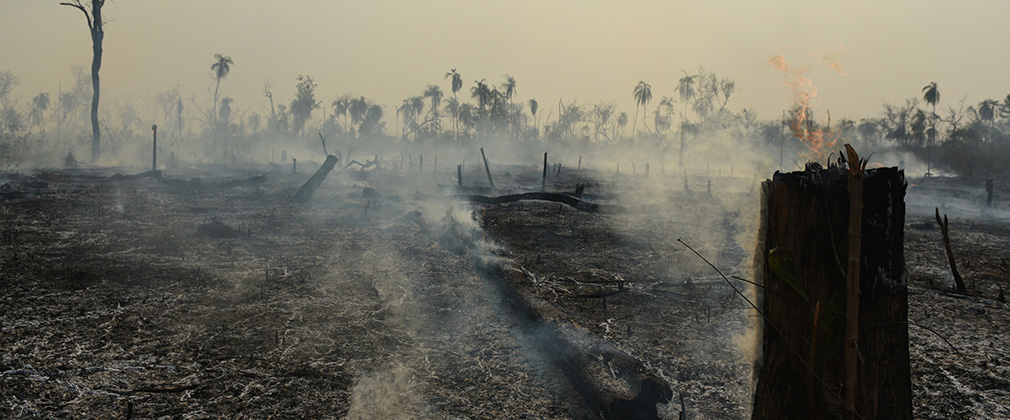True Cost Accounting: Can We Put a Price Tag on Extraction and Exploitation?
BALTIMORE—Feb. 3, 2020. The burning of the Amazon was one of the most tragic news stories of last year—and an unfortunate real-life illustration of where our food system goes wrong. Most of the fires are a result of deforestation, which is a result of farmers clearing land for raising beef cattle. In this (and other typical food system) scenario, large-scale cattle farmers and other powerful actors exploit and extract people and natural resources for their own short-term benefit. Meanwhile, the “lungs of the Earth” burn, and we lose the biodiversity contained in the Amazon. For many communities in the region and around the world, the current food system leads to many losses: their surrounding ecosystems, perhaps their livelihoods, their ancestral homes, or food sources.
Aside from the ethical and moral problems with the current model, other consequences include the degradation of agricultural land, the ubiquitousness of low-cost processed foods, and the economic displacement of farmers and land-based peoples.
How can we quantify the consequences and damage done by current food system models of business? Within food systems thinking, a new concept has emerged called True Cost Accounting, which seeks to help us comprehensively measure the negative impacts of the food system. In a new Johns Hopkins Center for a Livable Future white paper, "True Costs for Food System Reform: An Overview of True Cost Accounting Literature and Initiatives,” I take a look at the leading frameworks for True Cost Accounting, identify where there’s consensus and distinction in the frameworks, and make recommendations for future research to address gaps.
In ideal circumstances, evidence from True Cost Accounting (TCA) is put into practice to educate key food systems stakeholders such as policymakers, farmers and consumers to work toward a resilient and regenerative food system that supports public health, communities and ecosystems. TCA aims to incorporate non-monetized costs in the food system (externalities) into the decision-making of governments, industry, growers, and consumers. But the conceptualization of what this new pathway may look like remains unclear. There are at least two overlapping, yet distinct, conceptualizations of ways TCA could move forward:
- Work to monetize the harmful externalities of the food system in order to work towards more affordable and economically viable foods that benefit communities and the environment.
- Aim to expose the non-monetized costs in the food system in order to make scientifically valid arguments regarding trade-offs for decision makers and public funding.
While there may be shared goals (that is, improve the food sytem and quality of life around the world), I expect it will be difficult to reach agreement on how to reach these goals. The TCA concepts entail deeply political and philosophical—and therefore highly controversial— questions regarding the inherent value of nature and the role of the government and market forces to protect and conserve global natural “resources,” “capital,” and biodiversity in the food system.
Some stakeholders argue that to practice successful TCA requires new tools and methods to quantify these externalities, improved systems thinking and multilateral efforts in order to gain support in redirecting capital towards more sustainable and regenerative practices.
But I would argue that TCA is more appropriately used not only to convince stakeholders to redirect capital but to identify the structural lock-ins of the extractive economy in order to transform governance towards a more regenerative model. Financial and quantitative mechanisms for priceless concepts, such as biodiversity and ecosystem health, must consistently and meaningfully confront the relationship with capitalism and exploitation. Any TCA model should attempt structural change and must include leadership from producers of color, farmworkers, and indigenous groups in order to carefully avoid repeating the same errors.
TCA experts agree that structural and systems change is necessary to reverse negative externalities in the food system. However, stakeholders must decide how to strategically use “true cost” in its philosophical or financial meaning. In Foundation Earth’s recommendations to the World Bank for a True Cost Economy, they state, “The use of ‘Cost’ in this phrase is not a financial term. If something cost you your life, it would not be primarily a financial concern. If an economy were to cause a near-dead planet it would hardly be of financial concern to desperate people and the near-extinct or extinct species.” (Biosphere Smart)
Food system change is crucial for our fight to maintain global biodiversity and fight climate change. For decades, industry has fought to maintain their access to “cheap natures,” without which none of the world’s largest businesses would be profitable (TruCost). But this can no longer be tolerated; food system change is a question of survival.
As Jessica Dempsey states in Enterprising Nature, “The global political economy has for too long relied upon sacrifice zones, on sacrificed bodies, on sacrificed futures...A huge shift in political economic relations is needed to break these patterns, patterns that are a part of explaining the monoculturing of the planet.”
The CLF Report, "True Costs for Food System Reform: An Overview of True Cost Accounting Literature and Initiatives,” can be read here.
- Bill Niman: Critical Control Points
- Reginaldo Haslett-Marroquin: The Bill Is Already In The Mail
- Ferd Hoefner: The Soil Health Revolution
- Alessandro Demaio: Climate Change, Hunger And Framing The Solutions
Anna Aspenson is a 2020 Research Contractor at the Johns Hopkins Center for a Livable Future, and a graduate of the Master of Public Health program at the Johns Hopkins Bloomberg School of Public Health with a focus in food systems and community-based public health.
Photo: Felipe Werneck/Ibama https://www.flickr.com/photos/ibamagov/25758143568/
